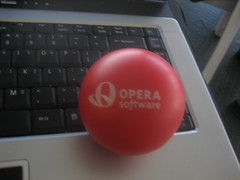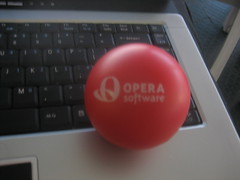I wake up around 10:00, and got to XTech around 11:00, but too late to join the Feed Experience talk, so my first talk of the day was a Microsummaries one. Also, I did miss Paul Graham’s talk about Startups and questioned if it’s possible to create a microclimat for startups in europe. He made a rather risky assumption that with time, people in Europe will start speaking one language, and local languages will be used only by old people and in small villages. With all admire to Paul, I’m with the people who think that he should first study europe culture for some time before saying such things.
I really like the idea, it does once more what Firefox is targeting in – improves the web usability in the simplest possible way. It has down to zero UI, and it may improve your workflow if you want to learn how to use it.
XBL2 talk was about mistakes in XBL, and success with XBL and what will make XBL 2 ready. For me, the most important parts was about standardization of XBL by W3C, and the plan to move xml based languages support in Mozilla to XBL. It means that once Opera, Safari, IE or any other webengine supports XBL it can just take XBL code for some language from Mozilla sources and get new language in 0 cost !!! Awesome. It seems that Opera will be the first engine to reuse XBL (2?).
XulRunner talk led by bsmedberg, was a great piece of art. He described the future of XulRunner as the opportunity to move rich web apps out of browser window to self window, and even ability to install web app, keeping it still on the web. Imagine that you could just d&d the web icon to your desktop, and launching it would open XulRunner and load the web app! You can keep to major features of web apps – like ability to easily upgrade, with desktop app behaviors. (on the last day, Hakon described similar goals for Opera). Also, we discussed the possibility of having less than 500 kb Firefox browser that would be platform independent. You could just launch it, and if your OS already have XulRunner, it would just work. No matter of the OS! If your OS doesn’t have XulRunner, it’ll just allow you to install XulRunner from the web. Simple, deadly simple 🙂 (shots: [1], [2])
He also proposed a format for expanding HTML anchors to open new windows as web apps instead of new window for browsing and a bit of future tricks for XulRunner plans. Can’t wait it! Also, during whole his talk, Benjamin had small clock widget on his screen. It was XulRunner SVG+JS based widget. That’s awesome. We did nothing specific to get widgets, and thanks to Gecko platform, we just “have” it 🙂
SVG talk was about how hard SVG is, and having canvas for simplified usage. SVG specs are huge, there’s no goal in trying to support current specs, it’s way to huge. For example Vlad mentioned, that SVG 1.2 was planned to have it’s own network support API. Stupiddddddd! We’re going to keep expanding SVG – it’ll get major improvement in Gecko 1.9 (with reworked reflow, font support on platform level, and fonts, and filters on SVG level), but we’re not going to try to support 100% of current specs, focusing on subsets and waiting for next specs. (shots: [1], [2], [3], [4], [5], [6], [7], [8])
Reflow talk – David described the history of laying out text, starting from paper column layout (where width of the text was an input, and height was an output), to tables, the first revolution where width/height was based on size of internal elements. Then he described floating just to summarize the current html language is totally not prepared to solve web authors needs, basing on the example of float as a thing that should never be used to lay out the page. (shots: [1], [2], [3], [4])
It looked like a call for changes to W3C 😉
Then we took a free wine/juice/water/beer for some time and went to the dinner with Tristan (Mozilla Europe), Ian, Andy (Flock), Max (OpenLaszlo), Daniel Glazman and Laurent Jouanneau (Distruptive Innovations). (shots: [1], [2], [3])
After the dinner, with Andy and Ian we joined Nadia and landed in Mediamatic – barcamp’s place where we spend the evening till late night.
That’s all for now 🙂



